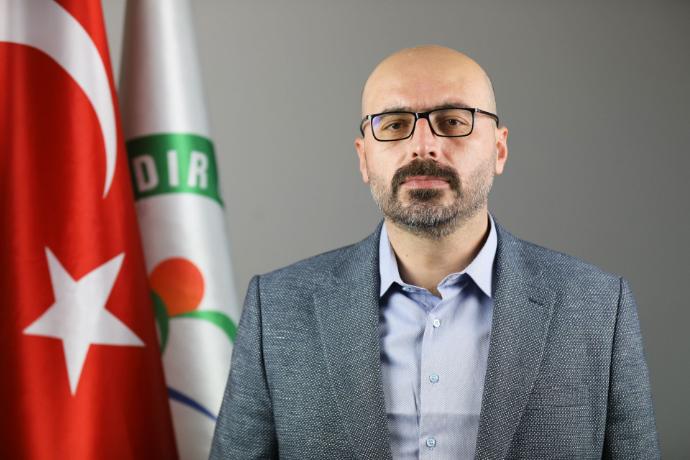Electricity Program
General Information
The Electricity Program at Iğdır University was established to train qualified technical personnel for the energy and electrical sectors. By combining theoretical and practical education, the program aims to contribute to regional development through its innovative educational approach. The program currently continues with 2 faculty members and 1 lecturer.
Program Outcomes of the Program:
Graduates of Our Program:
- They have knowledge in electrical energy, electronic circuit design, and power systems.
- They develop skills in renewable energy, industrial automation, and energy efficiency.
- They design electrical and electronic installation projects and perform maintenance and repair operations.
- They adopt professional ethics, workplace safety, analytical thinking, lifelong learning, and teamwork skills.
These outcomes aim to ensure that our graduates possess the necessary competencies for a successful career in the electrical and electronics industry.
Language / Type of Education:
- The language of instruction in the Electricity Program at Iğdır University is Turkish.
- Type of Education: The program is offered as a daytime education. Students receive full-time education according to a specific weekly schedule.
This educational model aims to provide students with both fundamental and advanced knowledge in the field of electrical and electronics. The program offers students not only theoretical knowledge but also practical application opportunities.
Infrastructure Facilities:
Our program provides students with laboratory facilities to work in areas such as electrical and electronic circuits, power systems, and industrial automation, offering hands-on training opportunities. Additionally, students can engage in projects related to renewable energy and energy efficiency. Workshops are available for practical education on topics like electrical installations and electronic circuit design. The mandatory internship program provides field experience opportunities. This infrastructure, supported by a library and online resources, enables students to apply theoretical knowledge in practice, ensuring they enter the industry well-equipped.
Academic Staff


Asst. Prof. Dr. Kenan Gürçam
Department Chair
kenan.gurcam@igdir.edu.tr
476 213 00 10 Internal : 32 02

Course Catalog
Double Major / Minor Programs
Double Major Program: It offers students the opportunity to earn a bachelor's degree in another department of their interest in addition to their primary department. In this program, students can complete the courses of two different departments and graduate with a diploma in both fields.
Minor Program: It allows students to take a certain number of courses in an area of interest outside their primary department. Students who complete the Minor program are awarded an official certificate in that field, but this does not constitute a second bachelor's degree.
- To access Double Major and Minor programs / https://www.igdir.edu.tr/yandal-ciftanadal-programlari.
Exchange Programs
Exchange Programs: These programs provide students with the opportunity to study at another university, either domestically or internationally, for a certain period. Through these programs, students can explore different cultures, improve their foreign language skills, and gain international academic experience. The most common exchange programs include Erasmus+, Mevlana, and Farabi.
- Erasmus Program Click here
- Mevlana Program Click
- Farabi Program Click
Career
Objectives and Goals:
The Iğdır University Electricity Program aims to prepare our students to be well-equipped for the rapidly evolving electrical and energy sectors. Our program combines theoretical knowledge with practical application, ensuring that our graduates become highly sought-after technical professionals in the industry.
Our goal is to equip students with expertise in areas such as electrical installations, power systems, renewable energy technologies, and automation, thereby developing individuals who possess the knowledge and skills to meet the needs of both the public and private sectors.
Our graduates have the opportunity to build successful careers in the energy sector, factories, construction sites, and maintenance services as professionals committed to ethical values, equipped with problem-solving and analytical thinking abilities. Our program, which encourages continuous learning, aims to help students adapt to evolving technologies and the changing needs of the industry.
Current Status of the Program:
Electricity programs focus on training technical personnel who possess fundamental technical knowledge and skills in the electrical and energy sectors, with the ability to apply them in the field. Critical areas such as electricity generation, transmission, distribution, and control are creating a rapidly growing job market today. As a result, graduates encounter a wide range of career opportunities.
Future of the Program
The rapid transformations in the energy sector and technological advancements present a promising outlook. The increasing demand in areas such as renewable energy sources, smart grids, electric vehicles, and automation technologies is creating broad career opportunities for program graduates. In particular, topics like digitalization, sustainability, and energy efficiency will further drive the demand for technicians. In this context, it is expected that programs will produce qualified professionals who adapt to the sector through innovative curricula and hands-on training. Graduates, with continuous learning and self-improvement, will be able to take on significant roles in this rapidly growing field.
Transition to Graduate Programs
Students who successfully complete the associate degree program can pursue studies in the undergraduate programs listed below, provided they achieve a valid score in the Vertical Transfer Exam (DGS).
Computer Engineering
Biomedical Engineering
Electrical Engineering
Electrical-Electronics Engineering
Electronics Engineering
Electronics and Communication Engineering
Energy Systems Engineering
Energy Management
Aviation Electrical and Electronics
Control and Automation Engineering
Mechatronics Engineering
Meteorology Engineering
Aircraft Electrical and Electronics
Software Engineering
Future Career Paths with Increasing Importance:
Electrical technology is an ever-evolving field, influenced by rapid developments in the technology and energy sectors. In the future, the career paths of electrical technicians will be shaped by factors such as technological innovations and sustainable energy solutions. Here are some career paths that will gain importance in the future:
1. Renewable Energy Systems Specialist
- Solar and Wind Energy: Electrical technicians specializing in the installation, maintenance, and repair of renewable energy systems such as solar panels and wind turbines are facing significant opportunities. The renewable energy sector is rapidly growing due to environmental concerns and sustainability-focused policies.
- Energy Storage Systems: Efficient use of renewable energy relies heavily on energy storage solutions. The installation and maintenance of systems in this field will become a key area of expertise for electrical technicians.
2. Smart Home and Building Technologies Specialist
- Smart Home Systems: Electrical technicians can specialize in the installation and maintenance of smart home systems that enhance energy efficiency, ensure security, and improve user experience. These systems provide automation in areas such as lighting, security, heating, cooling, and energy management within homes.
- Smart Buildings and Offices: The demand for smart building systems that enhance energy efficiency, security, and comfort in commercial and office buildings will continue to grow. Electrical technicians can take on the installation and maintenance of these systems.
3. Electric Vehicle Infrastructure Specialist
- Charging Stations: With the growing demand in the electric vehicle (EV) market, there will be an increasing need for expertise in EV charging infrastructure. Electrical technicians can play a key role in the installation and maintenance of EV charging stations.
- Electric Vehicle Systems: Working on electric vehicle batteries, charging systems, and electrical components will also be one of the significant career paths for electrical technicians in the future.
4. Industrial Automation and Robotics
- Industrial Automation: Electrical technicians will play a crucial role in the installation, maintenance, and repair of automation systems in factories and manufacturing facilities. Advancements in robotics and automation technologies will enhance the knowledge and skills of electrical technicians in this field.
- Advanced Control Systems: Control systems that enhance energy efficiency and automate industrial processes could become an area of expertise for electrical technicians.
5. Electrical Safety and Insulation Specialist
- Safety Systems: Electrical safety is becoming increasingly critical. Electrical technicians can specialize in implementing safety measures for high-voltage systems, as well as installing and maintaining insulation systems.
- Fire and Explosion Protection Systems: In facilities operating in hazardous areas, electrical fire safety and the installation of explosion protection systems will be a key area of expertise.
6. Building Energy Management and Efficiency Specialist
- Energy Efficiency and Management: Electrical technicians can develop solutions to enhance energy efficiency in buildings. Smart energy management systems help optimize energy use within buildings, reducing costs and minimizing environmental impact.
- Certification and Auditing: Electrical technicians can conduct audits to obtain energy efficiency certifications for buildings and provide energy-saving solutions.
7. IoT (Internet of Things) and Data Systems
- IoT Device Installation: Internet of Things (IoT) devices, particularly in industrial and home environments, fall within the area of expertise for electrical technicians. These devices have capabilities such as monitoring and optimizing energy consumption.
- Data Collection and Analysis: Electrical technicians can develop solutions for analyzing data collected from IoT devices, improving energy efficiency, and ensuring that systems operate more efficiently.
8. Efficient Energy Distribution and Smart Grids
- Smart Grids: Smart electrical grids are systems that improve the balance between energy production, transmission, and consumption, enhancing efficiency and reducing energy losses. Electrical technicians can specialize in the installation, maintenance, and management of these systems.
- Energy Distribution and Monitoring: The development of data collection, monitoring, and management systems in electricity distribution is an important area where electrical technicians can work.
Conclusion:
The future career paths of electrical technicians will be shaped by areas such as sustainable energy, smart technologies, and automation. By receiving training in these fields and adapting to new technologies, electrical technicians can become more competitive in the job market and pursue careers in high-demand areas of expertise.
Employment Opportunities:
Graduates of Iğdır University’s Electrical Program have extensive employment opportunities across various sectors. With the rapid advancement of electrical engineering and technology, electrical technicians can work in many fields. Employment opportunities are generally concentrated in the following sectors:
- Construction and Energy Sector: Electrical technicians can be involved in the installation, maintenance, and repair of electrical systems in construction projects. They can also work in energy production facilities, power plants, and energy transmission lines.
- Industry and Manufacturing: In factories, electrical technicians are responsible for the maintenance and repair of production machines, as well as the installation and maintenance of automation systems. This sector offers significant job opportunities for electrical technicians.
- Automotive and Electronics Sector: Electrical technicians are needed in the production, design, and maintenance of electric vehicles and electronic devices. Innovations in this field are increasing job opportunities in the sector.
- Installation and Building Management: Technicians are always needed for the installation, maintenance, and repair of electrical systems in commercial and residential buildings.
- Service Sector: Electrical technicians can take on roles in large enterprises, hotels, hospitals, and shopping malls to ensure the proper functioning of electrical installations and energy systems.
- Freelance Work: Electrical technicians can work independently, offering services such as the installation, repair, and maintenance of electrical systems to their clients.
Factors that Increase Job Opportunities:
- Education and Certifications: Obtaining additional certifications and training related to the field can enhance job prospects. Specializing in innovative areas (such as solar energy, electric vehicles) is particularly beneficial and can provide a competitive advantage in the job market.
- Experience: Experience is a key factor in the job search process, as it demonstrates the ability to apply technical knowledge in practice. Gaining practical experience through internships and part-time jobs can significantly enhance job opportunities.
- Technological Advancements: The electrical sector is a constantly evolving field. Mastering new technologies (such as IoT, smart home systems) makes electrical technicians more desirable in the job market.
In general, the job opportunities for electrical technicians are quite broad, and with the development of the sector, they are expected to continue increasing in the future.
Contact
Şehit Bülent Yurtseven Campus, Directorate of the Vocational School of Technical Sciences, Suveren/IĞDIR/TURKIYE
- Call Center: 444 9 447
Phone: +90 476 223 00 10 - 3210 - Faks: +90 476 223 00 10
- E-mail: tbmyo@igdir.edu.tr
Program Introduction Presentation
Bir bölüm veya programın temel özelliklerini, eğitim olanaklarını ve hedeflerini tanıtmak amacıyla hazırlanan sunumdur.
Contact
- Adres : Şehit Bülent Yurtseven Kampüsü, Tuzluca Meslek Yüksekokulu Müdürlüğü
- Çağrı Merkezi : 444 9 447
Telefon: +90 476 223 00 10 - 3405 - Fax: +90 476 223 00 17
- E-posta: tuzluca@igdir.edu.tr